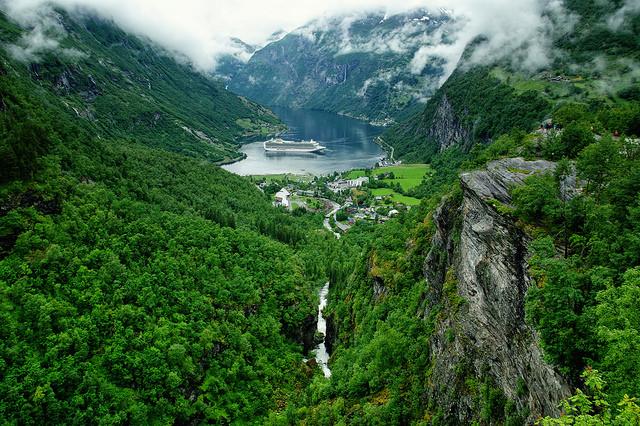“Norway: Behind the Scenes,” a lecture detailing the reasons behind Norway’s high quality of life, according to a 2017 scoring, was lead Tuesday by Peggy Hager, a senior lecturer on elementary and intermediate Norwegian language at the University of Wisconsin. Hager complimented her lecture with photos of beautiful Norwegian landscapes and fish-filled meals.
“Food reflects culture,” Hager said.
Her lecture also discussed a brief history of Norway’s economic history and how that context has led to what is now an economically prosperous country.
Hager discussed Norwegian life fully, touching on mannerisms different in Norway than in the U.S., such as not drinking coffee until after the meal or eating with a knife in the right hand and fork in the left.
But the bigger picture was also represented, as she also discussed statistical reasons for why Norway is rated so highly.
Norwegians enjoy a tuition-free education, subsidized student loans, free hospitals, universal health care, maternity and paternity leave for a combined year and child benefit money. Norway was also a trailblazer of sorts, becoming the first country to offer paid paternity leave, Hager said.
Economically, Norway and the U.S. both have an influx of oil, but their profits are directed differently. Norway’s top oil company is Equinor, while the U.S.’s top producer is Texaco. While Texaco’s profits primarily go to business owners, Equinor’s profits go to the government, Hager said.
Though Norway is well-off financially, Norwegian food is not Hager’s favorite. She joked that the country’s cuisine is most likely not reason the standard of living is so high.
Traditional Norwegian food is heavy in bread, potatoes, fish and meat, but the occasional vegetable has its time in the limelight.
It’s not common to eat a traditional sandwich in Norway, Hager said, but it is quite common to eat an open-faced version.
Traditional toppings for Norwegian open-faced sandwiches include fish, meat, cheese, jams and jellies, green peppers, tomatoes and cucumbers, Hager said.
Traditionally, dinner is eaten as early as 2 p.m. or 3 p.m., but a lighter, healthy meal follows later in the evening.
Norwegians enjoy fish like cod and salmon, but they also eat foods less commonly found in the U.S., such as whale meat or a sheep’s head. Hager said some people host sheep’s heads parties, where a whole sheep’s head is laid on a plate. Often, people claim the cheek is the tastiest part.
“Whale meat is like eating a steak,” Hager said. “It’s actually quite good.”
Despite their heavy focus on fish and meats, Norwegians indulge in many treats, too. Desserts like cakes and waffles are popular. But unlike American waffles, Norwegian ones are almost always heart-shaped and are eaten as a dessert, not for breakfast.
Norway’s landscapes are just as beautiful. With hikes like Bessegen, hikers climb up, sometimes on hands and knees, to the tops of mountains and rock ledges that overlook gorgeous lakes.
A total of 72 percent of Norway is made up of lakes, mountains and glaciers, Hager said. Only three percent of the country is arable, which leaves a lot of it covered by forests, lakes and rock structures.
Overall, the country is rich both physically in its landscapes, but also culturally in its traditional meals. After facing a history of impoverishment, Norway has made huge economic gains, which in part lead to its high standard of living.





















